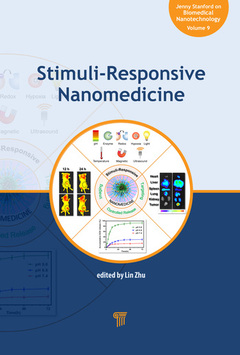Stimuli-Responsive Nanomedicine
Coordonnateur : Zhu Lin

The response to environmental and internal stimuli is one of the basic characteristics of living organisms. Inspired by this natural strategy and fast-developing nanotechnology and materials science, stimuli-responsive nanomedicine has emerged as an active and important field of nanomedicine.
This book offers a fundamental and comprehensive overview of stimuli-responsive nanomedicine and compiles and details the recent cutting-edge findings and most impressive achievements in biomedical applications, from a pharmaceutical science perspective, making it the first book of its kind in this field. By providing readers a broad and in-depth coverage of endogenous and exogenous stimuli as well as their applicable nanomedicines, this book is valuable for students, researchers, and educators in biomedical sciences or anyone interested in this burgeoning field.
Overview. pH-responsive nanomedicine for image-guided drug delivery. Enzyme-responsive nanomedicine. Redox-responsive nanomedicine. Hypoxia-responsive nanomedicine. Temperature-responsive nanomedicine. Magnetically responsive nanomedicine. Ultrasound-responsive nanomedicine. Light-triggered drug and gene delivery. Stimuli-responsive liposomes for cancer. Stimuli-responsive nanomedicine for treating non-cancer diseases.
Lin Zhu is associate professor in the Department of Pharmaceutical Sciences, Texas A&M University, USA. His interests include drug delivery and targeting, stimuli-sensitive nanomedicine, and bio/nanomaterials. He has authored or co-authored over 35 peer-reviewed articles and three books. He has received several research awards from the National Institutes of Health, American Association of Pharmaceutical Scientists, American Cancer Society, and Controlled Release Society.
Date de parution : 03-2021
15.2x22.9 cm
Thèmes de Stimuli-Responsive Nanomedicine :
Mots-clés :
Drug Release; Biomedical sciences; Delivery Systems; Biomedical applications; Polymeric Micelles; Pharmaceutical sciences; Magnetic Nanoparticles; Internal stimuli; pH Sensitive Liposomes; Stimuli-responsive nanomedicine; Gold Nanorods; Gold Nanoshells; Free DOX; Stimuli Responsive Drug Delivery; DDS; PVP; Drug Delivery; Anti-cancer Drugs; PAI; Thermosensitive Hydrogels; Bubble Liposomes; PAMAM Dendrimers; Thermosensitive Liposomes; DNA Polyplexes; Pam; Tri-block Copolymers; Stromal Cell Derived Factor-1 Alpha; Thermosensitive Polymers; NIR Light; American Chemical Society



